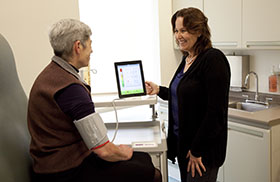Alumni distinction
Nurse explores technology to help older adults manage their health from home

Master's-degree student Anita Depatie demonstrates a blood pressure monitoring tool that operates on an iPad.
Editor's note: This story was first published in winter 2013. As of June 2013, Depatie is graduate of the School of Nursing.
Betty Irene Moore School of Nursing graduate student and registered nurse Anita Depatie loves technology. So it was a natural step for her to combine that enthusiasm with her experience caring for older adults who are managing their health conditions while still living at home.
These two interests converge in Depatie’s master’s-thesis research through the Nursing Science and Health-Care Leadership Graduate Group. Her study examines rural, older adults’ readiness to adopt mobile health technologies to manage chronic diseases and promote their health.
Depatie views mobile technology as a promising resource to assist older adults in managing their chronic conditions and staying healthy enough that they can continue to live at home.
“Technology has great potential to help people monitor their health status, manage their medications, remind them about health-care appointments and help them access health information,” Depatie said. “I think technology can be a great tool for helping older adults succeed in the community and in their homes, and increase access to health-care for those in remote rural areas.”
For her Nursing Science and Health-Care Leadership Graduate Group thesis project at the School of Nursing, Depatie is examining what factors may help rural, older adults adopt mobile technologies for health-related purposes, and what barriers impede the use of technology for these purposes.
Depatie conducted mobile health technology demonstrations while offering complimentary blood pressure screenings for older adults at two senior centers in rural Northern California. Using an iPad combined with a software application and blood pressure dock created by iHealth Lab, Inc., Depatie showed participants how to measure and monitor blood pressure using the system. The dock connects a blood pressure cuff to an iPhone or iPad. The associated software application reads the blood pressure measurements and enables users to track their measurements over time in a digital diary, visualize patterns with graphs, classify and interpret their measurements and share the results with health-care providers or others. Following the demonstration and screening, Depatie conducted anonymous surveys with the participants to find out whether they are interested in using this kind of technology and what factors might prevent them from doing so.
According to Depatie, blood pressure monitoring is just one example of how mobile technology could be used to promote health for older adults at home. Mobile health technologies exist, for instance, to help patients monitor their weight and share this information with their providers.
“Weight fluctuations are an important warning sign among people with congestive heart failure,” Depatie said, “and catching a weight gain quickly can help prevent hospitalizations among this population.”
For Depatie, finding ways to encourage the effective use of mobile health technology among older adults in rural areas has many possible benefits. First, this technology could provide vital connections to health care in areas where health-care providers are either far away or in short supply. Second, by helping older adults to monitor their health conditions from home, the technology could enable these individuals to continue living in their homes and prevent more costly interventions.
“Creating ways to deliver and monitor health-care among older adults who live at home will be crucial in the coming decades,” Depatie said.
The population of adults who are 65 years or older is expected to more than double by 2030, according to the U.S. Census. And, the overwhelming majority of people over 65 prefer to stay in their homes as long as possible, according to a 2011 report by the AARP Public Policy Institute.
“Inspiring people to change their behaviors in order to become healthier is one of the great challenges,” Depatie said. “Mobile health technology has the potential to facilitate patient empowerment and individual responsibility in the areas of health and wellness. If we can get programs into the community to help people care for themselves, we can improve health and reduce the burden on the health-care system that we have now.”
Depatie’s graduate study is supported in part through a Quinby-Young Scholarship for Healthy Aging. The educational experience at the School of Nursing has changed Depatie’s perspective on her role in transforming health care.
“My way of looking at problems in health care has changed,” Depatie said. “I used to look at problems in the health-care system as overwhelming. Now I look at them as opportunities—opportunities to improve quality and value in care.”





